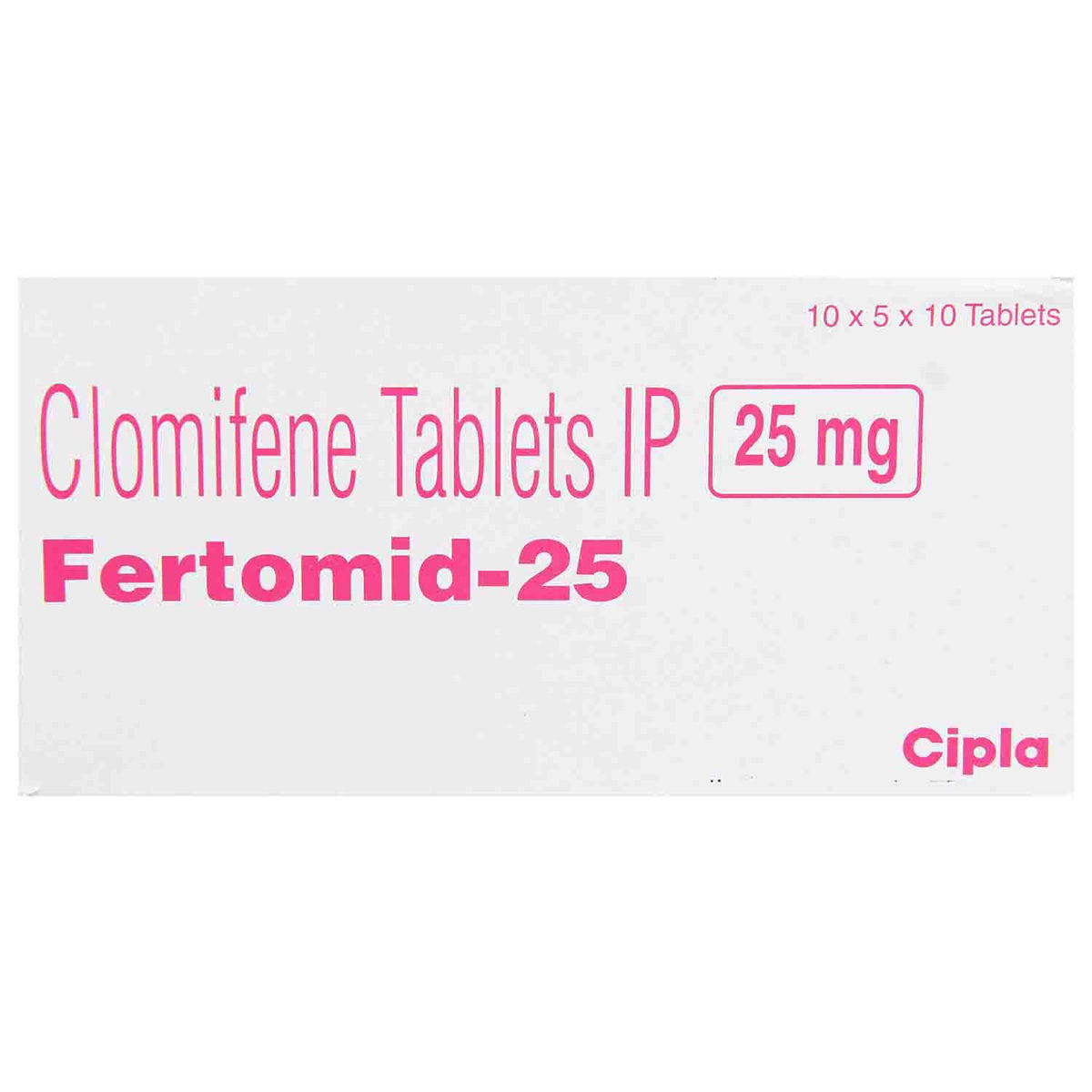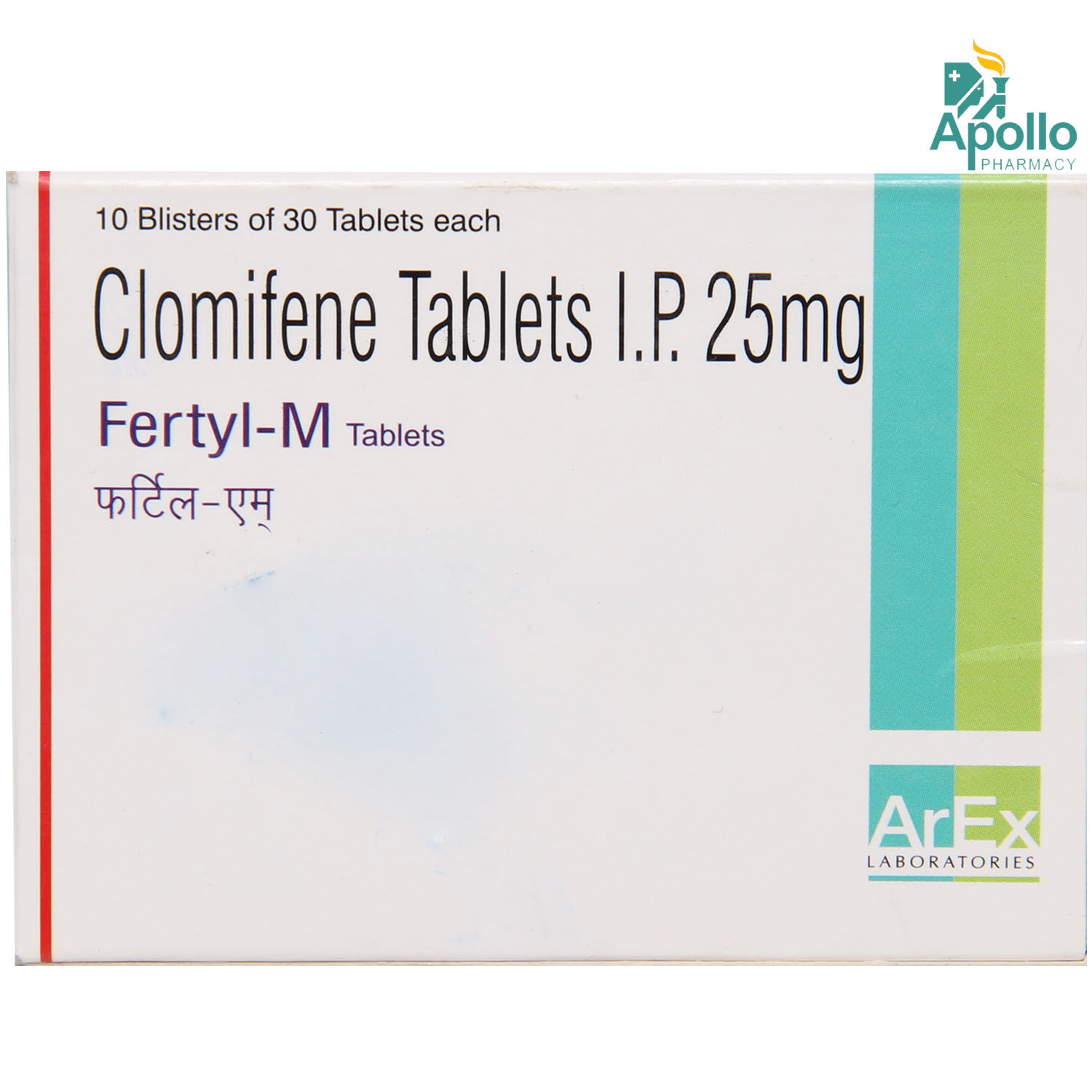Clomifene Citrate
About Clomifene Citrate
Clomifene Citrate belongs to the group of medications called 'ovulation stimulants' used to treat infertility in women who are not ovulating (producing an egg) properly or have irregular or no menstrual cycle. The problem with ovulation is a common cause of infertility in women.
Clomifene Citrate contains 'Clomifene Citrate' that works by stimulating the production of hormones responsible for the ovulation process.
Take Clomifene Citrate as prescribed by your doctor. The common side-effects of Clomifene Citrate are flushing (reddening of the skin, especially the face), headache, tiredness, dizziness, breast pain or tenderness, heavy periods, or bleeding between periods. Tell your doctor if any of these side effects persist or worsen.
Do not take Clomifene Citrate if you are allergic to any of its ingredients, have liver disease, unexplained and unusual menstrual bleeding, have a type of cancer that gets worse by hormones, or have an ovarian cyst. Clomifene Citrate is not recommended for pregnant women, children, adolescents, men, and post-menopausal women. Inform your doctor if you are breastfeeding as this medicine may affect the amount of breast milk produced.
Uses of Clomifene Citrate
Medicinal Benefits
Clomifene Citrate belongs to the group of medications called 'ovulation stimulants' used for fertility enhancement in women experiencing infertility due to problems with ovulation (production and release of an egg from the ovary). It works by stimulating the hormones that are necessary for the ovulation process.
Directions for Use
Storage
Side Effects of Clomifene Citrate
- Flushing (reddening of the skin, especially the face)
- Headache
- Tiredness
- Dizziness
- Breast pain or tenderness
- Heavy periods or bleeding between periods
Drug Warnings
Do not consume Clomifene Citrate if you are allergic or hypersensitive to Clomifene Citrate or any other ingredients of Clomifene Citrate. Inform your doctor if you are having an early menopause, diagnosed as infertile, menstrual periods were stopped due to being underweight, previously diagnosed with fits or seizures (fits), uterine fibroids (non-cancerous tumours in the womb), polycystic ovaries (presence of small cysts on the enlarged ovaries), swollen ovaries, or hypertriglyceridemia (increased fat levels in the body) or a family history of hypertriglyceridemia.
Drug Interactions
Drug-drug interactions: Clomifene Citrate may interact with an anti-cancer agent (e.g. bexarotene).
Drug-food interactions: Avoid/limit alcohol as it may increase the risk of side-effects of Clomifene Citrate.
Drug-disease interactions: Clomifene Citrate may interact with disease conditions such as abnormal uterine bleeding, liver failure, hyperlipidemia (increased fat levels), uncontrolled adrenal gland dysfunction, thyroid problems and pituitary tumours.
Drug-Drug Interactions Checker List:
Safety Advice

Alcohol
cautionAvoid alcohol consumption as it may worsen your condition and increase the risk of side effects.

Pregnancy
unsafeClomifene Citrate is a category X drug. Clomifene Citrate is not recommended for pregnant women as it may cause birth defects/congenital disabilities in the unborn baby.

Breast Feeding
cautionClomifene Citrate decreases the supply of breast milk. So, it should be used with caution in breastfeeding mothers.

Driving
cautionClomifene Citrate may cause vision problems, so do not drive or operate heavy machinery after taking Clomifene Citrate unless your vision is normal.

Liver
cautionClomifene Citrate should be used with extreme caution in patients with liver disease as the liver metabolises Clomifene Citrate. Dose adjustments may be necessary.

Kidney
cautionPlease consult your doctor if you have kidney problems before starting Clomifene Citrate.

Children
unsafeClomifene Citrate is not recommended for use in children.
Habit Forming
Diet & Lifestyle Advise
- Consume a healthy diet rich in fibre and proteins and low in carbohydrates and fats.
- Avoid processed or high-sugar foods.
- Stay active and shed excess weight if you are overweight or obese. Do not perform intense exercises as they may negatively impact your reproductive health. Increase the intensity of exercise gradually.
- Being underweight may also reduce your chances of getting pregnant. So, prepare a diet chart that can help you gain weight healthily.
- Avoid stress as it may decrease your chances of getting pregnant. Try relaxation techniques and receive support and counselling if necessary.
- Limit alcohol and caffeine intake.
- Quit smoking.
Special Advise
Clomifene Citrate may cause multiple pregnancies (pregnant with more than one child at the same time) or ectopic pregnancy (growing foetus outside the womb). These conditions may also occur if you are not taking this medicine. However, discuss with your doctor the possible risks before taking Clomifene Citrate.
Patients Concern
Disease/Condition Glossary
Female Infertility: A woman is said to have fertility problems when she cannot become pregnant within a year of trying. If a woman gets pregnant but experiences miscarriages or stillbirths, it is also included in infertility. The most common cause of infertility is the problem with ovulation or damage to the uterus.
FAQs
Clomifene Citrate belongs to the group of medications called 'ovulation stimulants' used to treat infertility in women who are not ovulating (producing an egg) properly or have irregular or no menstrual cycle.
Clomifene Citrate works by stimulating the production of necessary hormones for ovulation. Thus, it enhances fertility by inducing ovulation in women with fertility problems.
In most cases, women ovulate within 7 to 10 days after taking this medicine. However, ask your doctor if you have any questions regarding the benefits of Clomifene Citrate.
Clomifene Citrate can only enhance your chances of fertility. Not getting pregnant after taking this medicine may be due to low dosage, other underlying causes of infertility, or any comorbid conditions that interfere with Clomifene Citrate action. Consult your doctor to know the exact reason.
Most women ovulate 7 to 10 days following their last Clomifene Citrate dose. It would help if you had intercourse every day or every other day from Day 11 through Day 21 of your cycle.
Clomifene Citrate is a fertility medicine used to treat a variety of infertility difficulties. It works by increasing the development of eggs inside the ovaries' follicles. This can also help develop more mature follicles, resulting in the release of numerous eggs during ovulation, increasing your chances of conceiving a twin, triplet, or more.
Clomifene Citrate is not a cure for infertility. It can only enhance your chance of getting pregnant by inducing ovulation.
Clomifene Citrate is used to treat infertility. Do not use Clomifene Citrate for any other condition without a doctor’s advice.
Clomifene Citrate is prescribed for the treatment of infertility in women and does not play a role in enhancing sperm count or quality.
Clomifene Citrate can cause side effects such as headache, tiredness, dizziness, breast pain or tenderness, heavy periods, or bleeding between periods. Please, consult the doctor if these persist longer.









